Kenneth Atchity's Blog, page 198
October 14, 2013
10 Reasons to Read Dr. Fuddle and the Gold Baton
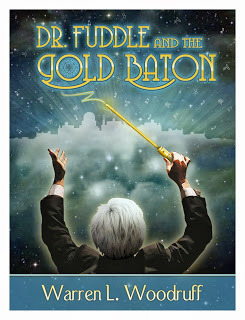
10. Piano practice is more fun if you pretend that you have to turn evil monsters into harmless pets by resolving the scales.
9. You’ve memorized The Lion, the Witch, and the Wardrobe and you want another story about children being called into a magical land to save it.
8. The book explains what a glass harmonica is, something I’ve been curious about since listening to a particular version of the Carnival of the Animals which acknowledged a section that was meant to be played on a glass harmonica being played on a gluckenspiele instead.
7. You need some new creative names for foods, like Bellini Bread or Rossini Rolls.
6. Reading Dr. Fuddle and the Gold Baton can be a balance reminding us of the importance of music, when we otherwise read way too many novels about math and science.
5. The abundant references to musical concepts, to composers and songs can help normalize the importance of musical knowledge. It encourages a child to say “I’ve heard of that!” It raises the bar for what is seen as normal everyday knowledge.
4. The book contains a glossary of music terms a child can refer back to.
3. The book provides positive role models. The children within it are struggling with different challenges – wanting to figure out who they are, and what they want in life. They deal with both guilt and forgiveness.
2. The book reinforces the idea of practice, that it takes time and energy to improve one’s skills at an instrument, but at the same time that music is not just about developing technical skill and bored routine.
1. Most importantly: the book is fun. It is well written, reasonably fast paced and has a bit of a surprise at the ending.
Reposed from Christy's Houseful of Chaos

Published on October 14, 2013 11:59
October 12, 2013
The Messiah Matrix by Kenneth John Atchity: Interview on Laurie's Thoughts and Reviews
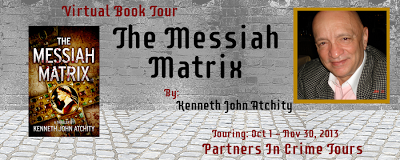

Tell us about your current release.
The Messiah Matrix is
a romantic thriller with an archaeological and historical underpinning that
explodes the origins of Christianity. A
skeptical young Jesuit priest, sent to Rome to prove the veracity of New
Testament events, encounters a vivacious archaeologist who’s discovered a
legendary gold coin in the ruins of ancient Caesarea. Together they attempt to
retrieve the coin, and to pursue the murderer of their mentor, and along the
way unravel secrets the Vatican has concealed for two thousand years. The story
is set in Israel and Rome. It’s fast-paced and explores the tension between
morality and religion, doubt and faith, celibacy and destined love.
Do you draw from personal experiences and/or
current events?
As all novelists do, I draw from both. Oddly
enough my novel unwittingly predicted the pope’s resignation and the election
of an Argentine Jesuit. But it also reflects my adolescent experiences growing
up Catholic and wondering if God would really send someone to hell for eating
meat on Friday or stealing $5.00 worth of peas instead of $4.99 worth.
Do you start with the conclusion and plot in
reverse or start from the beginning and see where the story line brings you?
I do both. I start wherever the sharpest image begins and
work backwards or forwards accordingly. That’s the beauty of this computer
age—you can go either way. Write the scene you feel like writing today, and put
it wherever it’s supposed to go later.
Is writing your full time job? If not, may I
ask what you do by day?
I’ve never written full time. I write when I
have something to say or have a story to tell, which has, I admit, gotten to be
more and more often. My day job is coaching other storytellers on how to get
their stories to their maximum audiences in today’s challenging and changing
world—and editing, managing, representing, and producing stories.
Who are some of your favorite authors?
Aside from my own clients, my favorite
authors go back to Homer, Virgil, Dante, Shakespeare, Cervantes, Sterne,
Wallace Stevens, Thomas Hardy, Melville, Garcia-Marquez, and Carlos Ruiz Zafón.
Would you rather read than watch TV/movie?
Yes.
Favorite beverage?
Vodka martini.
Tell us about your next release.
I’m currently working on AFI,
Inc., the first in a series of memoirs, prior to completing The Hong Kong Reversion, a thriller set
in Hong Kong.
Has someone mentored you in your writing career?
John Gardner (Grendel,
The Sunlight Dialogues), who edited my first scholarly book The Iliad: The Shield of Memory, constantly
led me to clarify and simplify my writing. His advice has guided me through the
years. Over the years I have helped dozens of thriller writers perfect their
work, find publishers and film productions. Steven J. Cannell (King Con, Vertical Coffin) encouraged me
to follow his lead and enter the ranks of novelists, which I did when, for my
late client William Diehl (Sharky’s
Machine, Primal Fear), I completed his novel Seven Ways to Die.
When in the day/night do you write? How long per day?
Although I’m a morning person, I write any time of day I can
steal an hour or two from my editing, managing, coaching and producing. On an
ideal day, I write from five to seven a.m. Over the years I’ve taught myself to
write anywhere, and particularly love writing on the plane.
Does your significant other read your stuff?
She does. After it’s published! Way after. I like to
compartmentalize things, especially criticism; and don’t ask it from those who
love me. But I have a small set of loyal editors who give me hell when I’m in
the revision mode. I counted forty-eight revisions of Messiah, and would still
like to do one more.
How do you describe your writing style?
I’d like to think it’s fast-paced and intelligent, but I’m
afraid it gets too scholarly now and then because I get carried away by the
research beneath the story.
What books are you reading now?
Preparatory to writing The
Hong Kong Reversion, I’m rereading Ian Fleming’s wonderful James Bond books
as well as James Patterson, and Viktor Frankl’s Man’s Search for Meaning. I
read all day, for joy, for research, and because my dayjob is helping
storytellers find their audiences.
What are your favorite TV shows?
Currently my favorite shows, other than the ones I’m
developing as a producer, include House
of Cards, Revenge, Homeland, Orphan Black, and Downton Abbey.
What do you do to unwind and relax?
I play tennis for two hours four times a week, go to the gym
two days a week, and walk and bike as well. Since I mostly work at home, dining
out with my wife and/or friends is a chief regular recreation; but travel is my
favorite way of “getting away”—we alternate between Asia and Europe, with side
trips to New York, Mexico and my native state Louisiana.

Published on October 12, 2013 00:00
October 11, 2013
Guest Post: How Not to Be a Writer: 15 Signs You’re Doing It Wrong by K.M. Weiland
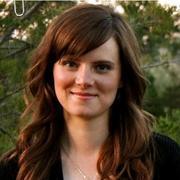
K.M.
Weiland
Ever
wonder if you’re doing this whole writing thing wrong? We have a bad
writing session. The words are all glomming up in the back of our minds and
refusing to flow across the page. Our editor hits us with a tough critique,
in which he offers the humble suggestion that we change, well, pretty much everything about our
story. Someone reads our story and, instead of laughing and crying in all the
right places, his best response is a half-hearted, “Meh.”
In the
face of evidence like that, it sure doesn’t seem like we’re quite acing the
How-to-Be-a-Writer checklist. Maybe we’d do better on a How-Not-to-Be-a-Writer
checklist.
Let’s
take a look at fifteen sure signs that maybe we really are acting more like non-writers
than writers—and how to remedy that.
1.
You’re trying to be the next Janet Evanovich/J.K. Rowling/G.R.R. Martin.
If we’re
investing all our energy and hopes in surpassing some of the biggest names in
the industry, we’re focusing on the wrong thing. Worse, if we’re trying to
imitate great authors’ styles in hopes of one day mimicking their success,
we’re dead in the water before we even start paddling.
2.
Your time is better spent on activities other than reading.
First,
if you don’t love reading so much you can’t stay away from it, you’ve
probably signed the wrong job application. Second, if you aren’t absorbing
storycraft through every pore, you’re missing your most important opportunity
to better your understanding of what it takes to write an amazing story.
3.
You’re obsessed with following The Rules.
The
Rules may be very important guidelines, but writing is about so much more
than that. Don’t get so hung up on The Rules that you lose touch with your
own guiding story sense.
4.
You’re protecting your originality by avoiding instruction on the craft.
The
techniques of writing and the theories of storytelling are so much bigger
than anything we can realize all on our own. The more we study our craft, the
better our art will be—and the sharper our ability to create original
material.
5.
You change your writing process every time an expert suggests something new.
Writing
experts may know a lot, but they don’t always know what’s right for you.
We all have to find the processes that best suit our personalities and
lifestyles, and once we find them, we need to stick with them.
6.
Your genius doesn’t need to be critiqued.
The
worst mistake any writer can make is that of claiming a genius that, ahem,
doesn’t really exist. Much better to assume you’re less skilled than you
really are so you’ll then be able to ask for (and accept) the help you need
to improve.
7.
Your tender ego can’t bear to be critiqued.
Yeah, critiques
hurt. Sometimes they’re about as much fun as a hug from the Iron Maiden.
But delicate writers die. Only the strong survive and, more importantly,
write better stories.
8.
You believe everything everyone tells you about your story.
Joe over
here says your main character is awesome. Lucinda says your ending is a
stinkfest. Angus likes your ending but hates your main character. Don’t
believe all of them—or even any of them. Weigh their opinions for exactly
what they’re worth and make up your own mind.
9.
You spend more time checking your email than working on your manuscript.
Procrastination
is a parasite. Most of us struggle with it from time to time. But if we’re
going to be writers, we must learn to purge it and again the discipline to
focus on what really matters—our writing.
10.
You start ten stories for every one you finish.
Sooner
or later, every story gets tough, and when it does, we become vulnerable to
the lure of shiny new ideas. But writers finish stories. Cultivate discipline
and force yourself to bring at least eight out of ten manuscripts to an end.
11.
You don’t believe you’re really a writer until you get something
published/you’re a bestseller/you get a movie deal/Stephen King blurbs your
book.
Writing
is not about glory. It is not about acclaim. It’s not about being published.
Writing is about writing. Enjoy the journey, do your best, and let the
chips fall where they may. You’ll be much happier for it—and your stories
will probably be all the better.
12.
You’re only writing a book in order to sell a gazillion copies, quit your day
job, and retire to the Bahamas.
The
other thing writing is not about is money. If you’re very, very lucky,
you’ll get to quit your day job. But, honestly, just forget about the rest of
it and focus on more productive and probable dreams—like winning the
Powerball.
13.
You talk about your story more than you write about it.
Talking
isn’t writing. Talking won’t get that manuscript finished (see Sign #10).
There’s nothing wrong with sharing a little of your story-fueled enthusiasm
with friends and family, but for every time you mention your story in
conversation, you’d better have written a least a page in your manuscript.
14.
You only write when you’re inspired.
Inspiration
is like a very cute puppy dog. You can’t depend on it worth beans. And you
sure as heck don’t want it being the master. You have to leash it, take
charge of it, and train it. And sometimes that means sitting down to write
even when it may appear that inspiration had stood you up.
15.
You’re not writing.
Writers
write. Bottom line.
Your
Turn: What is your worst writing habit?
About
the Author:
K.M. Weiland
grew up chasing Billy the Kid and Jesse James on horseback through the hills
of western Nebraska, where she still lives. A lifelong fan of history and the
power of the written word, she enjoys sharing both through her novels and
short stories. She blogs at Wordplay:
Helping Writers Become Authors, where she mentors other authors and
shares the ups and downs of the writing life.

Published on October 11, 2013 00:00
October 10, 2013
Kenneth Atchity Guest Post on Writers and Authors
Why Did You Write Such a Heavily-Researched Book as a Novel?

I’ve been asked that
question numerous times in interviews and emails, and it’s a good one.
As a former professor, I wrote more than a handful of scholarly books,
and certainly could have expanded on the premise of The Messiah Matrix as nonfiction instead of in the format of a romantic thriller.
My main reason for
choosing to write it as a novel is that, to quote Muriel Rukeyser, “the
universe is made of stories, not of atoms.” I wanted this story to reach
its maximum audience, and knew it would never do that as a nonfiction
“study” of the origins of Christianity in imperial Rome. Even
contemporary quantum physicists would agree that without our perception
and report reality would not be all it’s cracked up to be. If a tree
falls in the forest, and there’s no one to tell the story it simply
doesn’t matter whether it fell or not. We humans lead our lives through
stories, depending on them as coping mechanisms and guides through the
labyrinth of possibilities that face us every day—relying on them as
inspiration for continuing the struggle and as consolation when the
struggle comes to its inevitable end.
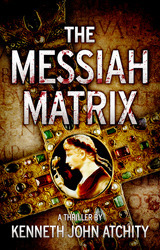
Once in a blue moon an idea comes your way that’s worthy of Herman Melville’s observation, in Moby Dick: “to
write a mighty book you must have a mighty theme.” When I started
putting together the parallels between Julius and Augustus Caesar and
Jesus, I knew no one would take them seriously unless they were
presented as part of a contemporary tale of relevance to our world
today. I’m not comparing my novel to Moby Dick, nor claiming it’s
a mighty tale—but its premise was powerful enough to compel me through
the forty-something drafts I went through in the four years it was on
the drawing board. I’d still like to do some more revising, and will no doubt do so on its way to the screen.
Storytelling is such a privilege that the ancient Greeks put the story teller, teknos, on a par with kings when it came to honoring his appearance in the polis. He
was the center of attention because in the preliterate world his songs
brought heroic behavior and insight into the human condition to a
populace hungry for meaning, for figuring out what life is all about.
Today’s novelist, making his way from blog to blog in the new frontier
that is the Internet, is like that ancient teknos. He is welcome if he tells a story that provokes us, that makes us laugh, or weep, or think.


I’ve been asked that
question numerous times in interviews and emails, and it’s a good one.
As a former professor, I wrote more than a handful of scholarly books,
and certainly could have expanded on the premise of The Messiah Matrix as nonfiction instead of in the format of a romantic thriller.
My main reason for
choosing to write it as a novel is that, to quote Muriel Rukeyser, “the
universe is made of stories, not of atoms.” I wanted this story to reach
its maximum audience, and knew it would never do that as a nonfiction
“study” of the origins of Christianity in imperial Rome. Even
contemporary quantum physicists would agree that without our perception
and report reality would not be all it’s cracked up to be. If a tree
falls in the forest, and there’s no one to tell the story it simply
doesn’t matter whether it fell or not. We humans lead our lives through
stories, depending on them as coping mechanisms and guides through the
labyrinth of possibilities that face us every day—relying on them as
inspiration for continuing the struggle and as consolation when the
struggle comes to its inevitable end.

Once in a blue moon an idea comes your way that’s worthy of Herman Melville’s observation, in Moby Dick: “to
write a mighty book you must have a mighty theme.” When I started
putting together the parallels between Julius and Augustus Caesar and
Jesus, I knew no one would take them seriously unless they were
presented as part of a contemporary tale of relevance to our world
today. I’m not comparing my novel to Moby Dick, nor claiming it’s
a mighty tale—but its premise was powerful enough to compel me through
the forty-something drafts I went through in the four years it was on
the drawing board. I’d still like to do some more revising, and will no doubt do so on its way to the screen.
Storytelling is such a privilege that the ancient Greeks put the story teller, teknos, on a par with kings when it came to honoring his appearance in the polis. He
was the center of attention because in the preliterate world his songs
brought heroic behavior and insight into the human condition to a
populace hungry for meaning, for figuring out what life is all about.
Today’s novelist, making his way from blog to blog in the new frontier
that is the Internet, is like that ancient teknos. He is welcome if he tells a story that provokes us, that makes us laugh, or weep, or think.

Published on October 10, 2013 00:00
October 9, 2013
Dr. Ken Atchity Guest Speaker at The Dole Institue of Politics, Fall Study Group Series.
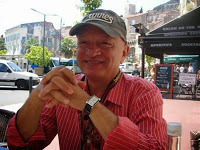
Dr. Ken Atchity, CEO and founder of Atchity Productions and Story
Merchant Guest Speaker at The Dole Institute of Politics, Fall Study
Group Series. Topic: The New Gutenberg Revolution.
Dole Institute of Politics, Fall 2013 Study Group series:“Exploring Untapped Markets: Global Entrepreneurship & Politics” with Dole Fellow Sarian Bouma.
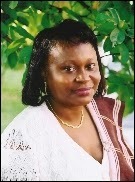 In today’s economy, private entrepreneurs and businesses innovate, produce, and compete vigorously, with consumers benefitting in the end. Entrepreneurs take incredible risk. That’s why it’s important to find the best resources and learn how to make government work for you. Dole Fellow Sarian Bouma will explore the art of entrepreneurship, the role of government, and opportunities to go global.
In today’s economy, private entrepreneurs and businesses innovate, produce, and compete vigorously, with consumers benefitting in the end. Entrepreneurs take incredible risk. That’s why it’s important to find the best resources and learn how to make government work for you. Dole Fellow Sarian Bouma will explore the art of entrepreneurship, the role of government, and opportunities to go global. 
Published on October 09, 2013 10:26
Tony Gilroy’s Top 10 Tips On How To Write A Hollywood Blockbuster
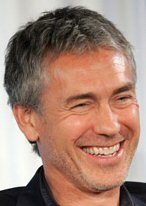 1. Go to the movies
1. Go to the moviesI don’t think there is anything you can learn from courses or books. You have been watching movies since you were born. You have filled your life with narrative… and food. It’s already way down deep inside you.
Going to the movies, having something to say, having an imagination and the ambition to do it is really all that is required. You can learn how to do anything.
2. Make stuff up but keep it real
This is imaginative work – screenwriters make things up. Everything I have in my life is a result of making things up. There is one thing that you have to know that is a deal-breaker – human behavior.
The quality of your writing will be directly related to your understanding of human behavior. You need to become a journalist for the movie that is in your head. You need to report on it; every scene has to be real.
3. Start small
Big ideas don’t work. Start with a very small idea that you can build on.
With Bourne I never read any of the books; we started again. The very smallest thing with [Jason] Bourne was, “If I don’t know who I am and I don’t know where I’m from, perhaps I can identify who I am by what I know how to do.” We built a whole new world around that small idea.
You just start small, you build out and you move one step after the next and that’s how you write a Hollywood movie.
Gilroy directed as well as wrote The Bourne Legacy, the fourth Bourne film
4. Learn to live by your wits
My father was a screenwriter but it’s not some pixie dust creative family thing. I learned from watching how hard he worked and learned about the tempo of a writer’s life – you have to live by your wits.
If you are living with someone who lives by their wits, it seems normal to you, it doesn’t scare you as much and you understand the rhythms of it.
5. Write for TV
It’s getting harder and harder to make good movies. TV is where the ambiguity and shades of reality live, it’s where stories can be interesting.
A lot of writers are very excited about TV right now and it’s a writer-controlled business. When writers are in control, good things happen. They are more rational, they are hardworking, they are more benevolent.
Every time writers have been put in charge of entertainment, things have worked out, so with TV maybe we will see a writer-driven utopia.
House of Cards is seen as part of a new era in quality television
6. Learn to write anywhere, anytime
I have an office at home, I’ve written in a million hotel rooms, I can write anywhere now. My whole goal is to want to be at my desk.
If the writing is going well, I don’t want to quit. I’m older and wise enough now that if something is going well, I don’t stop. I call and say I’m not coming home for dinner and just keep going.
More than anything else, I want to want to go to my desk and to not be afraid of going to work.
7. Get a job
I spent six years tending bar while I figured out how to write screenplays.
If you want to write, if you are a young writer and nobody knows you, find a job that pays you the most amount of money for the least amount of hours, so that you have the most amount of time left over to write.
You want to live some place where you have some sort of cultural connection and can see as many films and be around as many people as possible. You want to be some place where you can just write and write and write.
8. Get a life
If you don’t have anything to say and if you haven’t done anything except see a bunch of movies, then what’s the point? You can only write what you know about and that will either limit you or open the possibilities to everything.
Be interested in lots of things and stay interested. My knowledge is very wide and incredibly thin. It’s much more interesting when journalists and cops and doctors and bankers become screenwriters than 20-year-old film students.
There are some exceptions, of course, but if you don’t have anything to say, then why are you here?
9. Don’t live in Los Angeles
I don’t think there is any reason to live there, I think LA is probably very bad for you. It’s a bad place to feed your head.
In LA you are driving around all the time, surrounded by people who are making you depressed. I don’t think Hollywood really helps a young writer feel any sense of romance about their life.
Even if it’s a delusion, you want to feel special when you go to work in the morning.
10. Develop a thick skin and just keep going
I have assumed both positions of the Hollywood Kama Sutra – top and bottom.
It’s very important to be able to handle rejection. I think one of the reasons writers are shy is because we are all very suspicious of our own process because it fails so often.
It’s no different from being a novelist or a composer or a painter. When you get rejection from the outside world, you either move on or you don’t.
But I think the hardest times are all the days when nothing happens and everybody who has ever written anything knows what I’m talking about. A great day of writing tops everything.
Reposted From Deadline Hollywood

Published on October 09, 2013 00:00
October 8, 2013
Join Author 101 University for Marketing and Publishing Success - OCTOBER 24 - 27 Las Vegas, NV

The Premier Event for Marketing and Publishing Success
Expand your brand, your earnings and your reputation as the authority in your field.
RESERVE YOUR SPOT
Are you curious about what publishers like Harper Collins, Morgan James, Adams Media, Wiley, Random House, and Simon and Schuster are looking for?
What is the best way to get your manuscript read when you're an unpublished author?
Want to know the biggest mistakes to avoid when writing book proposals?
You'll be engaged as these top pros share their expertise, reveal the inner workings of the publishing industry, and discuss various approaches to common marketing and publishing challenges.

Published on October 08, 2013 10:47
October 7, 2013
Book Review and ebook Giveaway- The Messiah Matrix by Kenneth John Atchity
Ready to WIN your own ebook copy of this spectacular book?
ENTER TO WIN
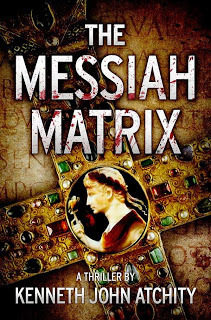
Review:
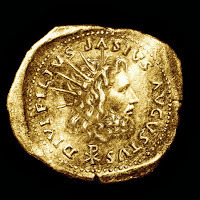 If there is one thing to sell this book alone it is- RESEARCH. Seriously- there are FIVE webpages of resources, that the author used to write this book! From the first chapter, you realize the Atchity has done his research, and this is NOT your typical archeology meets religion thriller- it is way more than that simple formula! And thanks to Atchity's great pacing and characters development, once you get bast the 2nd chapter, this book is VERY hard to put down. But be warned, by mid book you may be putting it down a lot to pick up your tablet and research what he is talking about, to see what is true and what isn't! The author has been references, including photos of locations in the book, available on his website, and I suggest looking through them, about midpoint in your reading. The book is not for the feint of heart, with its many Illiad, Virgil and other ancient references (though the author does a great job explaining where they all came from and placing proper context for the reader who may not know/remember them). Which all makes this a SMART, thought provoking roller coaster of a read that will make the reader see-saw back and forth, questioning what they were taught in bible school at a young age!
If there is one thing to sell this book alone it is- RESEARCH. Seriously- there are FIVE webpages of resources, that the author used to write this book! From the first chapter, you realize the Atchity has done his research, and this is NOT your typical archeology meets religion thriller- it is way more than that simple formula! And thanks to Atchity's great pacing and characters development, once you get bast the 2nd chapter, this book is VERY hard to put down. But be warned, by mid book you may be putting it down a lot to pick up your tablet and research what he is talking about, to see what is true and what isn't! The author has been references, including photos of locations in the book, available on his website, and I suggest looking through them, about midpoint in your reading. The book is not for the feint of heart, with its many Illiad, Virgil and other ancient references (though the author does a great job explaining where they all came from and placing proper context for the reader who may not know/remember them). Which all makes this a SMART, thought provoking roller coaster of a read that will make the reader see-saw back and forth, questioning what they were taught in bible school at a young age!
The author has said that he wanted to write a purely historical non-fiction book about the topic, but knew that if it was presented as such, it would have a limited readership, but by making the work a fictionalized account, he could include all the facts, and have a much larger audience. Well played Dr Atchity, well played!
chi rho sympol
Atchity admits that this tale could NOT have been written without his own Jesuit training, in all his lower and higher educational years, and that he in fact owes a great debt to the Jesuits who trained him, and this book is NOT an attempt to tear apart the foundations of today’s Roman Catholic Church, but to expose the truth, and what lays underneath, " They honed my mind with analysis to the point that it became impossible to accept anything at face value without looking beneath the surface to understand what made its face what it appears to be". Having spent 4 years with the Dominicans and 4 years with the Jesuits, I can heartedly agree with Atchity, and feel a kindred spirit, which could be why so much of the book resonated with me, especially about the use of the Chi-Rho, right, which we were taught to use when referencing Christ in school, and which I've found confounds most people when I use it now, instead of writing 'Christ'.Once you read this novel though, you may find yourself using it more and more!
From both my high school and college years, I was taught that it was ok to question, to search for universal truths, all in order to come back to a higher knowledge of "the divine within us and the human institutions that seek to profess it with rigidity and inhuman conclusions" (as Atchity so well says). This book may cause a lot of consternation- but the facts are the facts and while there is some evidence for the
historical existence of the Christian Savior, Jesus, the facts are that for all the 'miracles' and displays of divine that he did according to the Bible, there are no historical texts noting them. When you read the Nag Hammadi Gnostic texts, you DO start to question about what was left out of the Bible, and why, are were things as we think now. Read the ancient histories by Josephus Flavius, and other historians, and more questions come to light.
The Messiah Matrix IS a tour de force of classical scholarship, early church history and just flat out, great writing, that will allow the reader to understand all the available research in a simple way, and allow the reader to rethink what they truly know about the birth of Christianity, and it's evolution. My hat is off to Dr. Atchity for crafting a tome that will cause as much controversary, as it offers answers to questions many have had for hundreds of year! If there is one thing you can do for yourself, READ this book, do your own research, and then see which side of the proverbial fence you reside on!
About the Author:
Atchity, at age ten, began instructions in the Latin language from a multi-lingual Jesuit mentor and went on to continue his study of Latin, and to begin Homeric Greek, and French at the Jesuit high school, Rockhurst, in Kansas City, Missouri. He won an Ignatian Scholarship to Georgetown University in Washington, D.C., where he graduated as an English/Classics major and won the University Honor Program’s prestigious Virgilian Academy Silver Medal for his nationally-tested knowledge of Virgil’s Aeneid. At Georgetown, he added to his four years of high school Homeric Greek with studies of Attic and Koinaic Greek as well as further studies in Homer and four more years of Latin. He spent his junior year summer at King’s College, Cambridge. Atchity received his Ph.D. from Yale in Comparative Literature, after adding Italian to his seven languages, focused on the study of Dante under Harvard’s Dante della Terza and Yale’s Thomas Bergin.
His dissertation, Homer’s Iliad: The Shield of Memory, was awarded the Porter Prize, Yale Graduate School’s highest academic honor. His mentors at Yale included Thomas Bergin, Thomas Greene, A. Bartlett Giamatti, Richard Ellinger, Eric Segal, and Lowry Nelson, Jr. He was professor of literature and classics at Occidental College in Los Angeles, 1970-87, served as chairman of the comparative literature department, and as Fulbright Professor to the University of Bologna. His academic career included books on Homer and Italian literature, and dozens of academic articles and reviews. During his years at Occidental, Atchity was a frequent columnist for The Los Angeles Times Book Review, where he reviewed the novels of Umberto Eco, Doris Lessing, Gabriel Garcia-Marquez, Carlos Fuentes, and many others.
In a second career Atchity represented writers of both fiction and nonfiction, accounting for numerous bestsellers and movies for both television and big screen. In the tradition of Dominick Dunne, Sidney Sheldon, and Steven Cannell he has drawn on his professional experience with storytelling to write The Messiah Matrix.
ENTER TO WIN

Review:
 If there is one thing to sell this book alone it is- RESEARCH. Seriously- there are FIVE webpages of resources, that the author used to write this book! From the first chapter, you realize the Atchity has done his research, and this is NOT your typical archeology meets religion thriller- it is way more than that simple formula! And thanks to Atchity's great pacing and characters development, once you get bast the 2nd chapter, this book is VERY hard to put down. But be warned, by mid book you may be putting it down a lot to pick up your tablet and research what he is talking about, to see what is true and what isn't! The author has been references, including photos of locations in the book, available on his website, and I suggest looking through them, about midpoint in your reading. The book is not for the feint of heart, with its many Illiad, Virgil and other ancient references (though the author does a great job explaining where they all came from and placing proper context for the reader who may not know/remember them). Which all makes this a SMART, thought provoking roller coaster of a read that will make the reader see-saw back and forth, questioning what they were taught in bible school at a young age!
If there is one thing to sell this book alone it is- RESEARCH. Seriously- there are FIVE webpages of resources, that the author used to write this book! From the first chapter, you realize the Atchity has done his research, and this is NOT your typical archeology meets religion thriller- it is way more than that simple formula! And thanks to Atchity's great pacing and characters development, once you get bast the 2nd chapter, this book is VERY hard to put down. But be warned, by mid book you may be putting it down a lot to pick up your tablet and research what he is talking about, to see what is true and what isn't! The author has been references, including photos of locations in the book, available on his website, and I suggest looking through them, about midpoint in your reading. The book is not for the feint of heart, with its many Illiad, Virgil and other ancient references (though the author does a great job explaining where they all came from and placing proper context for the reader who may not know/remember them). Which all makes this a SMART, thought provoking roller coaster of a read that will make the reader see-saw back and forth, questioning what they were taught in bible school at a young age!The author has said that he wanted to write a purely historical non-fiction book about the topic, but knew that if it was presented as such, it would have a limited readership, but by making the work a fictionalized account, he could include all the facts, and have a much larger audience. Well played Dr Atchity, well played!
chi rho sympol
Atchity admits that this tale could NOT have been written without his own Jesuit training, in all his lower and higher educational years, and that he in fact owes a great debt to the Jesuits who trained him, and this book is NOT an attempt to tear apart the foundations of today’s Roman Catholic Church, but to expose the truth, and what lays underneath, " They honed my mind with analysis to the point that it became impossible to accept anything at face value without looking beneath the surface to understand what made its face what it appears to be". Having spent 4 years with the Dominicans and 4 years with the Jesuits, I can heartedly agree with Atchity, and feel a kindred spirit, which could be why so much of the book resonated with me, especially about the use of the Chi-Rho, right, which we were taught to use when referencing Christ in school, and which I've found confounds most people when I use it now, instead of writing 'Christ'.Once you read this novel though, you may find yourself using it more and more!
From both my high school and college years, I was taught that it was ok to question, to search for universal truths, all in order to come back to a higher knowledge of "the divine within us and the human institutions that seek to profess it with rigidity and inhuman conclusions" (as Atchity so well says). This book may cause a lot of consternation- but the facts are the facts and while there is some evidence for the
historical existence of the Christian Savior, Jesus, the facts are that for all the 'miracles' and displays of divine that he did according to the Bible, there are no historical texts noting them. When you read the Nag Hammadi Gnostic texts, you DO start to question about what was left out of the Bible, and why, are were things as we think now. Read the ancient histories by Josephus Flavius, and other historians, and more questions come to light.
The Messiah Matrix IS a tour de force of classical scholarship, early church history and just flat out, great writing, that will allow the reader to understand all the available research in a simple way, and allow the reader to rethink what they truly know about the birth of Christianity, and it's evolution. My hat is off to Dr. Atchity for crafting a tome that will cause as much controversary, as it offers answers to questions many have had for hundreds of year! If there is one thing you can do for yourself, READ this book, do your own research, and then see which side of the proverbial fence you reside on!
About the Author:
Atchity, at age ten, began instructions in the Latin language from a multi-lingual Jesuit mentor and went on to continue his study of Latin, and to begin Homeric Greek, and French at the Jesuit high school, Rockhurst, in Kansas City, Missouri. He won an Ignatian Scholarship to Georgetown University in Washington, D.C., where he graduated as an English/Classics major and won the University Honor Program’s prestigious Virgilian Academy Silver Medal for his nationally-tested knowledge of Virgil’s Aeneid. At Georgetown, he added to his four years of high school Homeric Greek with studies of Attic and Koinaic Greek as well as further studies in Homer and four more years of Latin. He spent his junior year summer at King’s College, Cambridge. Atchity received his Ph.D. from Yale in Comparative Literature, after adding Italian to his seven languages, focused on the study of Dante under Harvard’s Dante della Terza and Yale’s Thomas Bergin.
His dissertation, Homer’s Iliad: The Shield of Memory, was awarded the Porter Prize, Yale Graduate School’s highest academic honor. His mentors at Yale included Thomas Bergin, Thomas Greene, A. Bartlett Giamatti, Richard Ellinger, Eric Segal, and Lowry Nelson, Jr. He was professor of literature and classics at Occidental College in Los Angeles, 1970-87, served as chairman of the comparative literature department, and as Fulbright Professor to the University of Bologna. His academic career included books on Homer and Italian literature, and dozens of academic articles and reviews. During his years at Occidental, Atchity was a frequent columnist for The Los Angeles Times Book Review, where he reviewed the novels of Umberto Eco, Doris Lessing, Gabriel Garcia-Marquez, Carlos Fuentes, and many others.
In a second career Atchity represented writers of both fiction and nonfiction, accounting for numerous bestsellers and movies for both television and big screen. In the tradition of Dominick Dunne, Sidney Sheldon, and Steven Cannell he has drawn on his professional experience with storytelling to write The Messiah Matrix.

Published on October 07, 2013 12:48
Check Out this Q & A with Ken Atchity on CMash Reads
Guest Author KENNETH JOHN ATCHITY
Guest Author, Partners In Crime Tours, Showcase
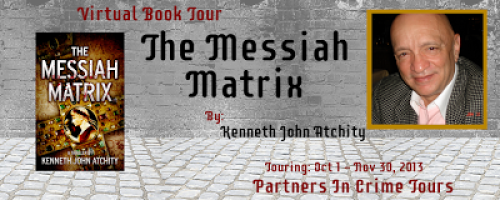
WELCOME KENNETH JOHN ATCHITY
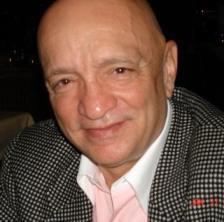
KENNETH JOHN ATCHITY
The author of The Messiah Matrix, Kenneth John Atchity, at the age of
ten began instructions in the Latin language from a multi-lingual
Jesuit mentor and went on to continue his study of Latin, and to begin
Homeric Greek, and French at the Jesuit high school, Rockhurst, in
Kansas City, Missouri. He won an Ignatian Scholarship to Georgetown
University in Washington, D.C., where he graduated as an
English/Classics major and won the University Honor Program’s
prestigious Virgilian Academy Silver Medal for his nationally-tested
knowledge of Virgil’s Aeneid.
At Georgetown, he added to his four years of high school Homeric
Greek with studies of Attic and Koinaic Greek as well as further studies
in Homer and four more years of Latin. He spent his junior year summer
at King’s College, Cambridge.
Atchity received his Ph.D. from Yale in Comparative Literature, after
adding Italian to his seven languages, focused on the study of Dante
under Harvard’s Dante della Terza and Yale’s Thomas Bergin. His
dissertation, Homer’s Iliad: The Shield of Memory, was awarded the
Porter Prize, Yale Graduate School’s highest academic honor. His mentors
at Yale included Thomas Bergin, Thomas Greene, A. Bartlett Giamatti,
Richard Ellinger, Eric Segal, and Lowry Nelson, Jr.
He was professor of literature and classics at Occidental College in
Los Angeles, 1970-87, served as chairman of the comparative literature
department, and as Fulbright Professor to the University of Bologna. His
academic career included books on Homer and Italian literature, and
dozens of academic articles and reviews. During his years at Occidental,
Atchity was a frequent columnist for The Los Angeles Times Book Review,
where he reviewed the novels of Umberto Eco, Doris Lessing, Gabriel
Garcia-Marquez, Carlos Fuentes, and many others.
In a second career Atchity represented writers of both fiction and
nonfiction, accounting for numerous bestsellers and movies for both
television and big screen. In the tradition of Dominick Dunne, Sidney
Sheldon, and Steven Cannell he has drawn on his professional experience
with storytelling to write The Messiah Matrix.
Connect with Ken at these sites:
[image error] [image error] [image error]
Q&A with Ken Atchity
Do you draw from personal experiences and/or current events?
As all novelists do, I draw from both. Oddly enough my novel unwittingly
predicted the pope’s resignation and the election of an Argentine
Jesuit. But it also reflects my adolescent experiences growing up
Catholic and wondering if God would really send someone to hell for
eating meat on Friday or stealing $5.00 worth of peas instead of $4.99
worth.
Do you start with the conclusion and plot in reverse or start from the beginning and see where the story line brings you?
I do both. I start wherever the sharpest image begins and work backwards
or forwards accordingly. That’s the beauty of this computer age—you can
go either way. Write the scene you feel like writing today, and put it
wherever it’s supposed to go later.
Your routine when writing? Any idiosyncrasies?
Although I’m a morning person, I write any time of day I can steal an
hour or two from my editing, managing, coaching and producing. On an
ideal day, I write from five to seven a.m. Over the years I’ve taught
myself to write anywhere, and particularly love writing on the plane. I
use a stopwatch to make sure I get my two hours in every day.
Is writing your full time job? If not, may I ask what you do by day?
I’ve never written full time. I write when I have something to say or
have a story to tell, which has, I admit, gotten to be more and more
often. My day job is coaching other storytellers on how to get their
stories to their maximum audiences in today’s challenging and changing
world—and editing, managing, representing, and producing stories.
Who are some of your favorite authors?
Aside from my own clients, my favorite authors go back to Homer, Virgil,
Dante, Shakespeare, Cervantes, Sterne, Wallace Stevens, Thomas Hardy,
Melville, Garcia-Marquez, and Carlos Ruiz Zafón.
What are you reading now?
Preparatory to writing The Hong Kong Reversion, I’m rereading Ian
Fleming’s wonderful James Bond books as well as James Patterson, and
Viktor Frankl’s Man’s Search for Meaning. I read all day, for joy, for
research, and because my dayjob is helping storytellers find their
audiences.
Are you working on your next novel? Can you tell us a little about it?
I’m currently working on AFI, Inc., the first in a series of memoirs,
prior to completing The Hong Kong Reversion, a thriller set in Hong
Kong.
Your novel will be a movie. Who would you cast?
I’d die to have Claire Danes as Emily Scelba.
Would you rather read or watch TV/movie?
Yes.
Favorite food?
My grandmother’s Syrian beans.
Favorite beverage?
Vodka martini.
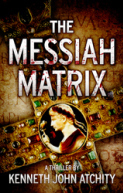
ABOUT THE BOOK
The Messiah Matrix by Kenneth John Atchity is a fast-paced
contemporary thriller in which a young Jesuit priest becomes
romantically entwined with a vivacious archaeologist as they pursue the
hidden history that links Jesus Christ with Augustus Caesar. A year
before it occurred, the novel predicted the resignation of the pope and
the election of an Argentine Jesuit to succeed him. In a story that will
leave readers breathless and hungry for more, Atchity weaves a
compelling tale about the foundations of today’s Roman Catholic Church
lying deep in the religious rituals of the ancient Roman Empire.
From the first page to the last The Messiah Matrix takes the reader
on a riveting adventure from the ancient city of Caesarea in Israel to
Rome’s labyrinthine catacombs and beyond, and provides gripping evidence
for all those who have ever wondered about the historical existence of
the Christian Savior. The Messiah Matrix is a tour de force of modern
drama and intrigue, classical scholarship, and early church history that
will change the way you understand the birth of Christianity.
The Messiah Matrix may prove to be one of the most controversial
novels ever written. Graeco-Roman scholar, professor, and producer Dr.
Atchity is perhaps the only author alive today capable of creating this
ground-breaking work.
Guest Author, Partners In Crime Tours, Showcase

WELCOME KENNETH JOHN ATCHITY

KENNETH JOHN ATCHITY
The author of The Messiah Matrix, Kenneth John Atchity, at the age of
ten began instructions in the Latin language from a multi-lingual
Jesuit mentor and went on to continue his study of Latin, and to begin
Homeric Greek, and French at the Jesuit high school, Rockhurst, in
Kansas City, Missouri. He won an Ignatian Scholarship to Georgetown
University in Washington, D.C., where he graduated as an
English/Classics major and won the University Honor Program’s
prestigious Virgilian Academy Silver Medal for his nationally-tested
knowledge of Virgil’s Aeneid.
At Georgetown, he added to his four years of high school Homeric
Greek with studies of Attic and Koinaic Greek as well as further studies
in Homer and four more years of Latin. He spent his junior year summer
at King’s College, Cambridge.
Atchity received his Ph.D. from Yale in Comparative Literature, after
adding Italian to his seven languages, focused on the study of Dante
under Harvard’s Dante della Terza and Yale’s Thomas Bergin. His
dissertation, Homer’s Iliad: The Shield of Memory, was awarded the
Porter Prize, Yale Graduate School’s highest academic honor. His mentors
at Yale included Thomas Bergin, Thomas Greene, A. Bartlett Giamatti,
Richard Ellinger, Eric Segal, and Lowry Nelson, Jr.
He was professor of literature and classics at Occidental College in
Los Angeles, 1970-87, served as chairman of the comparative literature
department, and as Fulbright Professor to the University of Bologna. His
academic career included books on Homer and Italian literature, and
dozens of academic articles and reviews. During his years at Occidental,
Atchity was a frequent columnist for The Los Angeles Times Book Review,
where he reviewed the novels of Umberto Eco, Doris Lessing, Gabriel
Garcia-Marquez, Carlos Fuentes, and many others.
In a second career Atchity represented writers of both fiction and
nonfiction, accounting for numerous bestsellers and movies for both
television and big screen. In the tradition of Dominick Dunne, Sidney
Sheldon, and Steven Cannell he has drawn on his professional experience
with storytelling to write The Messiah Matrix.
Connect with Ken at these sites:
[image error] [image error] [image error]

Q&A with Ken Atchity
Do you draw from personal experiences and/or current events?
As all novelists do, I draw from both. Oddly enough my novel unwittingly
predicted the pope’s resignation and the election of an Argentine
Jesuit. But it also reflects my adolescent experiences growing up
Catholic and wondering if God would really send someone to hell for
eating meat on Friday or stealing $5.00 worth of peas instead of $4.99
worth.
Do you start with the conclusion and plot in reverse or start from the beginning and see where the story line brings you?
I do both. I start wherever the sharpest image begins and work backwards
or forwards accordingly. That’s the beauty of this computer age—you can
go either way. Write the scene you feel like writing today, and put it
wherever it’s supposed to go later.
Your routine when writing? Any idiosyncrasies?
Although I’m a morning person, I write any time of day I can steal an
hour or two from my editing, managing, coaching and producing. On an
ideal day, I write from five to seven a.m. Over the years I’ve taught
myself to write anywhere, and particularly love writing on the plane. I
use a stopwatch to make sure I get my two hours in every day.
Is writing your full time job? If not, may I ask what you do by day?
I’ve never written full time. I write when I have something to say or
have a story to tell, which has, I admit, gotten to be more and more
often. My day job is coaching other storytellers on how to get their
stories to their maximum audiences in today’s challenging and changing
world—and editing, managing, representing, and producing stories.
Who are some of your favorite authors?
Aside from my own clients, my favorite authors go back to Homer, Virgil,
Dante, Shakespeare, Cervantes, Sterne, Wallace Stevens, Thomas Hardy,
Melville, Garcia-Marquez, and Carlos Ruiz Zafón.
What are you reading now?
Preparatory to writing The Hong Kong Reversion, I’m rereading Ian
Fleming’s wonderful James Bond books as well as James Patterson, and
Viktor Frankl’s Man’s Search for Meaning. I read all day, for joy, for
research, and because my dayjob is helping storytellers find their
audiences.
Are you working on your next novel? Can you tell us a little about it?
I’m currently working on AFI, Inc., the first in a series of memoirs,
prior to completing The Hong Kong Reversion, a thriller set in Hong
Kong.
Your novel will be a movie. Who would you cast?
I’d die to have Claire Danes as Emily Scelba.
Would you rather read or watch TV/movie?
Yes.
Favorite food?
My grandmother’s Syrian beans.
Favorite beverage?
Vodka martini.

ABOUT THE BOOK
The Messiah Matrix by Kenneth John Atchity is a fast-paced
contemporary thriller in which a young Jesuit priest becomes
romantically entwined with a vivacious archaeologist as they pursue the
hidden history that links Jesus Christ with Augustus Caesar. A year
before it occurred, the novel predicted the resignation of the pope and
the election of an Argentine Jesuit to succeed him. In a story that will
leave readers breathless and hungry for more, Atchity weaves a
compelling tale about the foundations of today’s Roman Catholic Church
lying deep in the religious rituals of the ancient Roman Empire.
From the first page to the last The Messiah Matrix takes the reader
on a riveting adventure from the ancient city of Caesarea in Israel to
Rome’s labyrinthine catacombs and beyond, and provides gripping evidence
for all those who have ever wondered about the historical existence of
the Christian Savior. The Messiah Matrix is a tour de force of modern
drama and intrigue, classical scholarship, and early church history that
will change the way you understand the birth of Christianity.
The Messiah Matrix may prove to be one of the most controversial
novels ever written. Graeco-Roman scholar, professor, and producer Dr.
Atchity is perhaps the only author alive today capable of creating this
ground-breaking work.

Published on October 07, 2013 10:09
October 4, 2013
Dr. Fuddle and the Gold Baton - Five Day Giveaway Until October 3 - 7
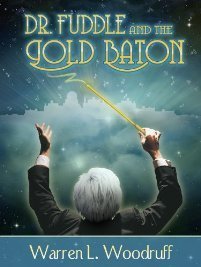 Get This Book for FREE
Get This Book for FREE
Dr. Fuddle And The Gold Baton
by Warren L. Woodruff
Get This Book for FREE
When the dark musician Jedermann and his fierce Seirens of Dis gain
control of the legendary Gold Baton, Tyler, his sister Christina, and
their friends are drawn into a perilous adventure foretold by an ancient
prophecy.
Guided by the mythical Dr. Fuddle, the explorers must leave earth and
journey to Orphea. Will the Messengers of Music be able to save the
world of the immortal composers from chaos and destruction? For them to
have even a chance at victory, they must master the most difficult
instruments of all—themselves.

Published on October 04, 2013 20:00



